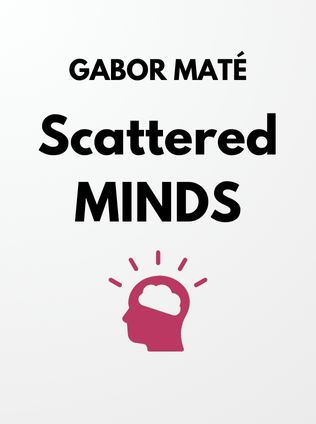
Scattered Minds
The Origins and Healing of Attention Deficit Disorder
By Gabor Maté
Published 01/2019
About the Author
Gabor Maté is an internationally renowned family doctor and author with a special focus on childhood development and the impact of trauma on health. His expertise in this area is not just professional but personal as well. Maté himself, along with his children, has been diagnosed with ADHD, giving him a deeply personal understanding of the condition. His works, including Scattered Minds, reflect his dedication to exploring the intricate connections between mind, body, and society, particularly how early childhood experiences shape our mental health.
Maté’s perspective is holistic and compassionate, focusing not just on the symptoms of ADHD but on its roots in early life stress and trauma. His approach challenges the conventional medical narrative, which often emphasizes medication as the primary treatment. Instead, Maté advocates for a deeper understanding of the environmental and emotional factors that contribute to ADHD, offering a path toward healing that involves nurturing both the mind and the body.
Main Idea
In Scattered Minds, Gabor Maté presents a compelling argument that ADHD is not merely a genetic or biological disorder but a condition deeply rooted in early childhood experiences and environmental factors. He posits that early stress and trauma disrupt the normal development of the brain, particularly in sensitive children, leading to the symptoms commonly associated with ADHD. Maté emphasizes that while medication can manage symptoms, it does not address the underlying causes. Instead, he advocates for a holistic approach to healing, one that involves understanding and addressing the emotional and psychological needs that were unmet in childhood.
Maté’s work is a call to action, urging parents, caregivers, and society at large to rethink how we approach ADHD. Rather than viewing it as a disorder that needs to be fixed with medication, he encourages us to see it as a response to the child’s environment, one that can be mitigated and even healed through love, attention, and proper nurturing. His book is not just a guide for those with ADHD but a manifesto for how we can create a more supportive and understanding world for those who struggle with this condition.
Table of Contents
- Understanding ADHD: A Holistic Perspective
- The Role of Childhood Stress in ADHD Development
- Healing Through Connection: Rebuilding the Parent-Child Bond
- Strategies for Adult Healing: Re-Parenting Yourself
- Supporting Children with ADHD: A Guide for Parents
- The Future of ADHD: Preventative Measures and Societal Responsibility
Understanding ADHD: A Holistic Perspective
Maté’s approach to ADHD is rooted in the biopsychosocial model, which considers the interplay between biological, psychological, and social factors in the development of the condition. He argues that ADHD is not purely a result of genetic inheritance but is significantly influenced by early life experiences. This perspective is a departure from the traditional view that ADHD is solely a biological disorder that can be treated with medication. Maté’s theory is grounded in the idea that the brain is plastic and continually shaped by the environment, particularly during the formative years of childhood.
According to Maté, ADHD symptoms—such as inattention, impulsivity, and hyperactivity—are manifestations of an underlying disruption in the brain’s development. This disruption, he believes, is often caused by early childhood stress, which prevents the brain from developing the necessary structures and connections to regulate attention and behavior effectively. Maté’s holistic perspective emphasizes the importance of addressing these underlying causes rather than just managing symptoms.
The Biopsychosocial Model
Maté’s holistic approach aligns with the biopsychosocial model of health, which suggests that our overall well-being is shaped by the interaction of biological, psychological, and social factors. In the context of ADHD, this means recognizing that while genetics may play a role, the environment in which a child is raised, the psychological stress they experience, and their social interactions all contribute to the development of the condition.
One of Maté’s key arguments is that genes alone do not determine whether a child will develop ADHD. Instead, he believes that sensitive children, who are more attuned to their environment and more affected by stress, are particularly vulnerable to developing ADHD if they are exposed to adverse conditions during their early years. This perspective challenges the notion that ADHD is an inevitable outcome for some children and instead suggests that it can be prevented or mitigated with the right environmental support.
Sign up for FREE and get access to 1,400+ books summaries.
You May Also Like
The Subtle Art of Not Giving a F*ck
A Counterintuitive Approach to Living a Good Life
By Mark MansonRich Dad Poor Dad
What the Rich Teach Their Kids About Money - That the Poor and Middle Class Do Not!
By Robert T. KiyosakiHow To Win Friends and Influence People
The All-Time Classic Manual Of People Skills
By Dale CarnegieFreakonomics
A Rogue Economist Explores the Hidden Side of Everything
By Steven D. Levitt and Stephen J. Dubner



















